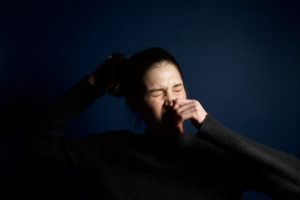May 16, 2019 | Black & Kletz Allergy

The symptoms may be relieved with medications that block the actions of these chemicals which can be utilized to make allergic individuals more comfortable. The symptoms may also be prevented either by avoiding the exposure to the allergens, by environmental controls, or by getting desensitized to the allergens by allergy immunotherapy (allergy shots, allergy injections, allergy desensitization, allergy hyposensitization). Sensitizing allergens can vary from person to person and allergy tests obtained by skin or blood testing are needed to identify the offending allergen in order to consider specific environmental controls and/or desensitizing treatments.
What if one has all the symptoms suggestive of “allergies” but all the tests are negative? You may have a condition called vasomotor rhinitis or more appropriately called non-allergic rhinitis.
The symptoms of non-allergic rhinitis may include:
- Nasal congestion
- Runny nose
- Sneezing
- Mucus (i.e., phlegm) in the throat (e.g. post-nasal drip)
- Cough
These symptoms can be long term or may last only a short period of time. They can come and go all year-round. Itching of the nose, eyes, and/or throat are not present in non-allergic rhinitis as they are more likely to be features of allergic rhinitis (i.e., hay fever).
The exact cause of non-allergic rhinitis is not known. The effect is widening of the blood vessels inside the nostrils and leakage of fluids into the tissues resulting in excessive mucus and swelling of the mucus membrane linings and nasal turbinates.
The common triggers of non-allergic rhinitis are:
- Environmental or occupational irritants: Dust, smoke, pollutants, strong odors, perfumes, colognes, potpourri, chemical sprays, fumes, etc.
- Weather changes: Fluctuations in temperature and humidity.
- Food: Hot and spicy foods, certain alcoholic beverages.
- Infections: Viral infections such as the common cold or influenza (i.e., the flu)
- Medications: Aspirin, Ibuprofen, certain blood pressure medications (e.g., beta-blockers ACE inhibitors), sedatives, antidepressants, and oral contraceptives.
- Rhinitis medicamentosa: Prolonged and/or overuse of over-the-counter decongestant nasal sprays (e.g., Afrin, Neosynephrine) can cause rebound congestion and habituation.
- Hormonal changes: Pregnancy, menstruation, and hypothyroidism.
- Stress: Emotional or physical stress.
- Other triggers: Sleeping posture, sleep apnea, acid reflux, etc.
Complications:
- Nasal polyps: These are soft, benign growths that develop on the lining of the nose or sinuses due to chronic inflammation. Small polyps may not cause problems, but larger ones may block the airflow through the nose, making it difficult to breathe. They also increase the likelihood of recurrent sinus infections.
- Sinusitis: Prolonged nasal congestion due to non-allergic rhinitis may increase the chances of developing sinusitis, an infection or inflammation of the membranes that line the sinuses.
- Middle ear infections: Increased fluid and nasal congestion may lead to middle ear infections.
- Interrupted daily activities: Non-allergic rhinitis may affect focus and concentration and in turn impact learning at school and/or productivity at work.
The diagnosis is established when one presents with the classic symptoms of rhinitis and when the skin tests and/or blood tests fail to identify specific environmental sensitivities. Common infections of the nose and sinuses also need to be ruled out by examination and imaging tests. There are no confirmatory tests for non-allergic rhinitis and it is usually an exclusion diagnosis.
Treatment:
Avoidance of the common triggers is the first step in the management of non-allergic rhinitis. When avoidance is not possible or when it does not work, the following actions may be helpful.
- An over-the-counter nasal saline spray or homemade salt water solution to flush the nose of irritants and help thin the mucus and soothe the membranes inside the nose.
- Corticosteroid nasal sprays (e.g., fluticasone, triamcinolone, budesonide) may help reduce the congestion due to their anti-inflammatory effect by shrinking the swelling and reducing excessive mucus production.
- Antihistamine nasal sprays (e.g., azelastine, olopatadine) are more helpful than oral antihistamines in relieving the symptoms of non-allergic rhinitis.
- Anticholinergic nasal sprays (e.g., ipratropium bromide) can help to dry up the excessive nasal secretions and relieve runny nose and post nasal drip.
- Oral decongestants (e.g., pseudoephedrine, phenylephrine) can help relieve nasal stuffiness by shrinking the blood vessels and reducing mucus buildup. Side effects of these medications however may include elevated blood pressure, rapid pulse, restlessness, sleep disturbances, palpitations, and/or tremors.
Prevention:
A recent small study showed that eating oily fish (e.g., herring, mackerel, salmon) at least once a week may reduce the risk of rhinitis. However more studies are needed to confirm this finding.
The board certified allergists at Black & Kletz Allergy have 3 convenient locations with on-site parking located in Washington, DC, McLean, VA (Tysons Corner, VA), and Manassas, VA. The Washington, DC and McLean, VA offices are Metro accessible and we offer a free shuttle that runs between the McLean, VA office and the Spring Hill metro station on the silver line. The allergy specialists at Black & Kletz Allergy are extremely knowledgeable regarding non-allergic rhinitis as well as allergic rhinitis. We diagnose and treat both pediatric and adult patients. In addition, we treat patients with food, medication, insect sting, and skin allergies, asthma, eosinophilic esophagitis, sinus disease, and immunological disorders. To schedule an appointment, please call any of our offices or you may alternatively click Request an Appointment and we will respond within 24 hours by the next business day. We have been servicing the Washington, DC, Northern Virginia, and Maryland metropolitan area for more than 50 years and we look forward to providing you with comprehensive state-of the-art allergy care in a friendly and professional environment.












